Old Testament
Genesis Exodus Leviticus Numbers Deuteronomy Joshua Judges Ruth 1 Samuel 2 Samuel 1 Kings 2 Kings 1 Chronicles 2 Chronicles Ezra Nehemiah Esther Job Psalms Proverbs Ecclesiastes Song of Solomon Isaiah Jeremiah Lamentations Ezekiel Daniel Hosea Joel Amos Obadiah Jonah Micah Nahum Habakkuk Zephaniah Haggai Zechariah MalachiAmos 6:3 Similar Verses
Amos 6:3 Cross References
Ye that put far away the evil day, and cause the seat of violence to come near;
Uncover the Rich Themes and Topics of This Bible Verse
Listed below are the Bible themes associated with Amos 6:3. We invite you to explore each theme to gain deeper insights into the Scriptures.
Amos 6:3 Cross Reference Verses
This section features a detailed cross-reference designed to enrich your understanding of the Scriptures. Below, you will find carefully selected verses that echo the themes and teachings related to Amos 6:3 KJV. Click on any image to explore detailed analyses of related Bible verses and uncover deeper theological insights.
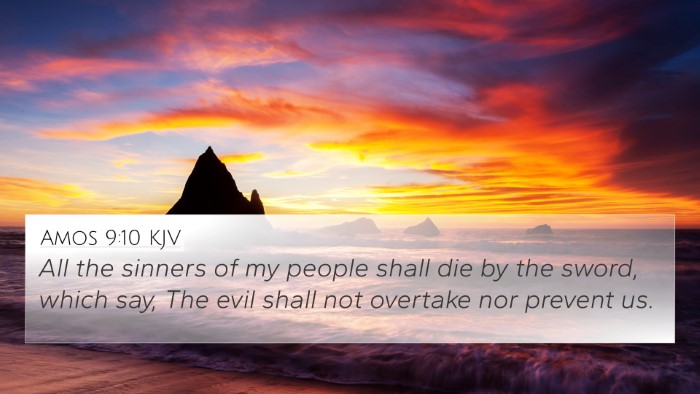
Amos 9:10 (KJV) »
All the sinners of my people shall die by the sword, which say, The evil shall not overtake nor prevent us.

Isaiah 56:12 (KJV) »
Come ye, say they, I will fetch wine, and we will fill ourselves with strong drink; and to morrow shall be as this day, and much more abundant.
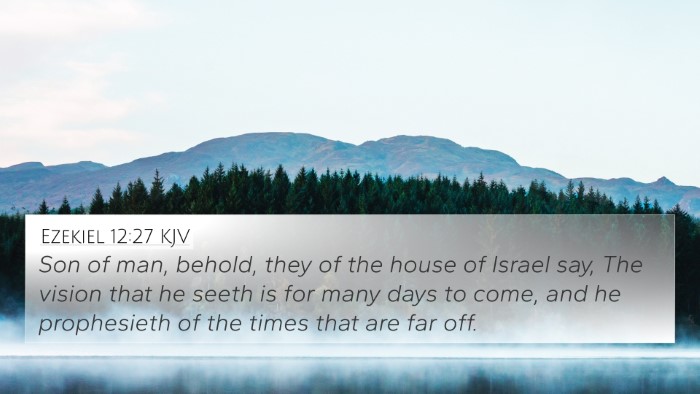
Ezekiel 12:27 (KJV) »
Son of man, behold, they of the house of Israel say, The vision that he seeth is for many days to come, and he prophesieth of the times that are far off.
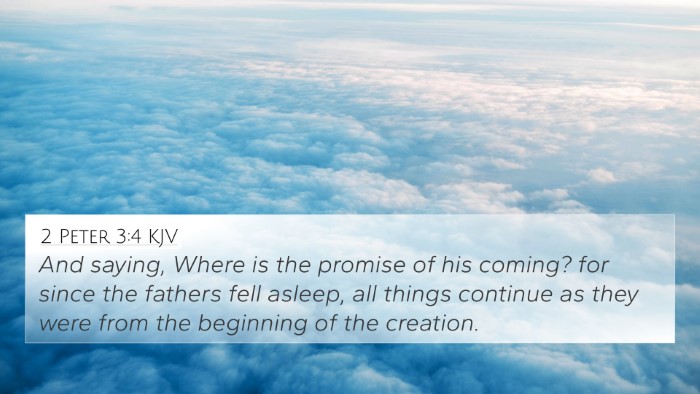
2 Peter 3:4 (KJV) »
And saying, Where is the promise of his coming? for since the fathers fell asleep, all things continue as they were from the beginning of the creation.

1 Thessalonians 5:3 (KJV) »
For when they shall say, Peace and safety; then sudden destruction cometh upon them, as travail upon a woman with child; and they shall not escape.
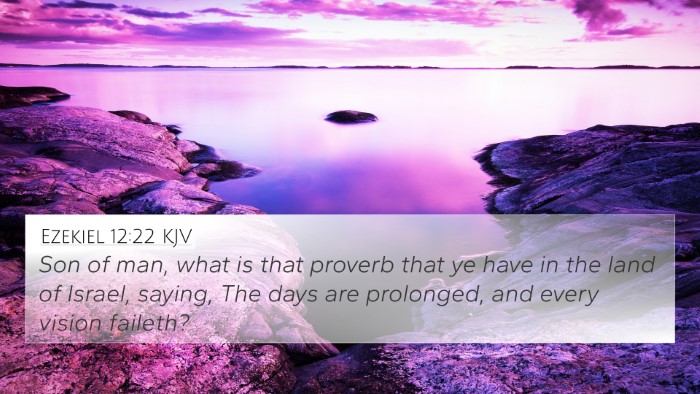
Ezekiel 12:22 (KJV) »
Son of man, what is that proverb that ye have in the land of Israel, saying, The days are prolonged, and every vision faileth?

Matthew 24:48 (KJV) »
But and if that evil servant shall say in his heart, My lord delayeth his coming;
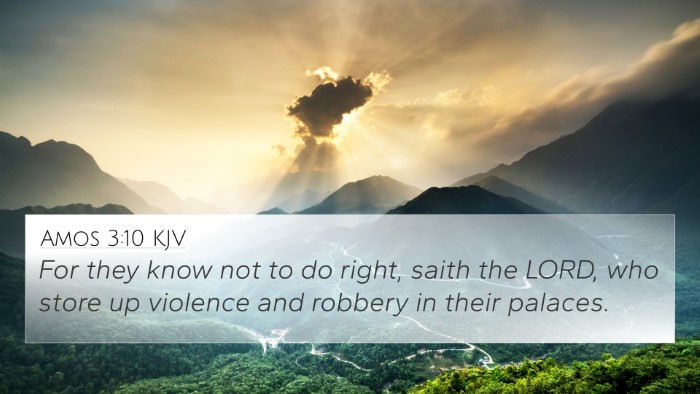
Amos 3:10 (KJV) »
For they know not to do right, saith the LORD, who store up violence and robbery in their palaces.

Amos 6:12 (KJV) »
Shall horses run upon the rock? will one plow there with oxen? for ye have turned judgment into gall, and the fruit of righteousness into hemlock:
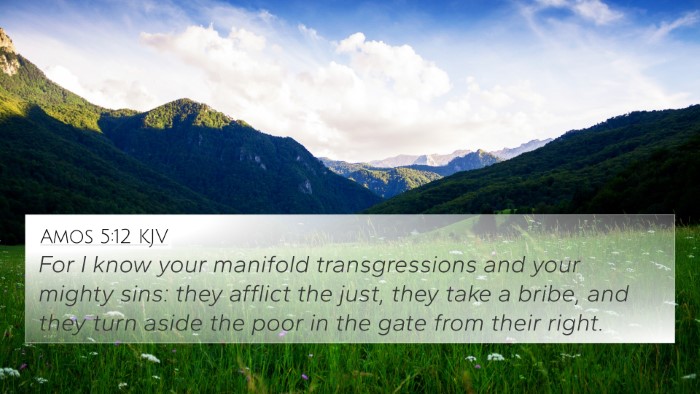
Amos 5:12 (KJV) »
For I know your manifold transgressions and your mighty sins: they afflict the just, they take a bribe, and they turn aside the poor in the gate from their right.
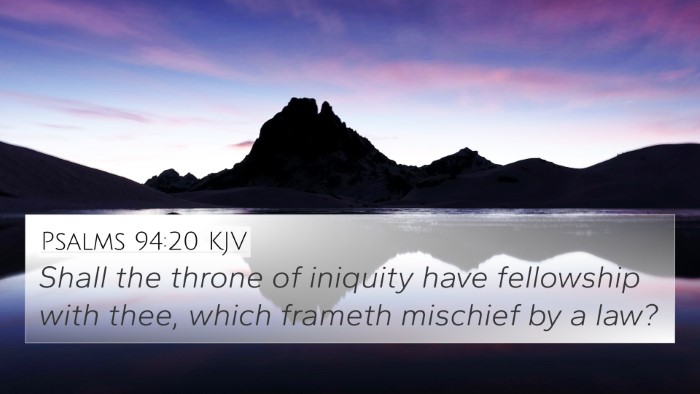
Psalms 94:20 (KJV) »
Shall the throne of iniquity have fellowship with thee, which frameth mischief by a law?
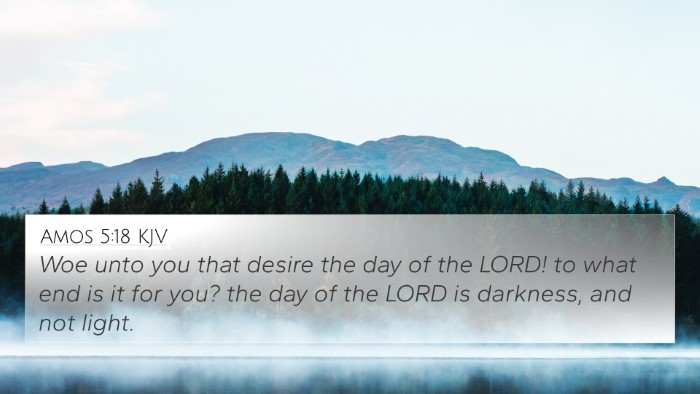
Amos 5:18 (KJV) »
Woe unto you that desire the day of the LORD! to what end is it for you? the day of the LORD is darkness, and not light.

Isaiah 47:7 (KJV) »
And thou saidst, I shall be a lady for ever: so that thou didst not lay these things to thy heart, neither didst remember the latter end of it.
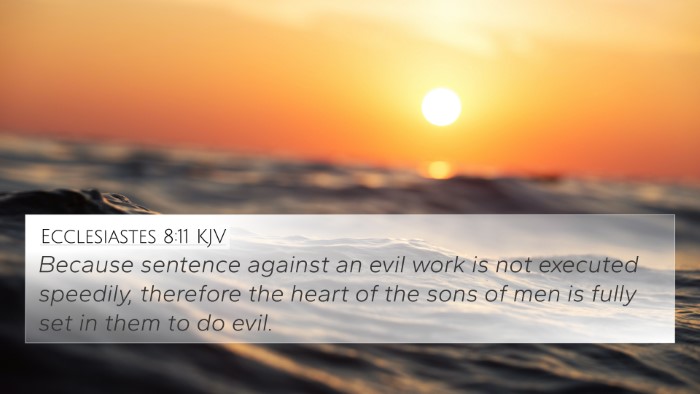
Ecclesiastes 8:11 (KJV) »
Because sentence against an evil work is not executed speedily, therefore the heart of the sons of men is fully set in them to do evil.

Revelation 18:17 (KJV) »
For in one hour so great riches is come to nought. And every shipmaster, and all the company in ships, and sailors, and as many as trade by sea, stood afar off,
Amos 6:3 Verse Analysis and Similar Verses
Understanding Amos 6:3 - A Comprehensive Analysis
Amos 6:3 states: "Ye that put far away the evil day, and cause the seat of violence to come near;" This verse encapsulates a critical message regarding complacency and false security among the people of Israel.
Verse Meaning and Context
The book of Amos is filled with prophetic declarations aimed at the Northern Kingdom of Israel. In this particular verse, the prophet Amos addresses the self-assuredness of the affluent citizens of Israel who disregard impending judgment.
According to Matthew Henry, this verse highlights how people tend to ignore or postpone the consequences of their actions, believing that judgment is far off. Henry notes that such attitudes lead to moral decay, as individuals focus on their own comforts rather than the cries for justice around them.
Albert Barnes reinforces this by explaining that the wealthy were insensitively pursuing their pleasures without regard for the societal rot surrounding them. Their actions not only blunted their moral senses but also invited destruction upon themselves.
Adam Clarke adds that the phrase "put far away the evil day" signifies a deliberate act of ignoring the reality of danger or Divine judgment. This attitude reflects a profound disconnect between their present material enjoyment and the spiritual consequences of their actions.
Thematic Bible Verse Connections
This verse can be linked to several other scriptures that call for awareness of God's impending judgment:
- Jeremiah 23:17 - "They say still unto them that despise me, The LORD hath said, Ye shall have peace; and they say unto every one that walketh after the imagination of his own heart, No evil shall come upon you." (Addresses false security)
- Isaiah 5:19 - "That say, Let him make speed, and hasten his work, that we may see it: and let the counsel of the Holy One of Israel draw nigh and come, that we may know it!" (Mockery of God's timing)
- 2 Peter 3:4 - "And saying, Where is the promise of his coming? for since the fathers fell asleep, all things continue as they were from the beginning of the creation." (Skepticism towards God's plans)
- Luke 12:45 - "But and if that servant say in his heart, My lord delayeth his coming; and shall begin to beat the menservants and maidens, and to eat and drink, and to be drunken;" (Caution against complacency)
- Matthew 24:48-50 - "But and if that evil servant shall say in his heart, My lord delayeth his coming; and shall begin to smite his fellowservants, and to eat and drink with the drunken;" (The call for vigilance)
- Ezekiel 12:27 - "Son of man, behold, they of the house of Israel say, The vision that he seeth is for many days to come, and he prophesieth of the times that are far off." (Disregarding prophecy)
- Matthew 25:5 - "While the bridegroom tarried, they all slumbered and slept." (Awareness of spiritual slumber)
Interpreting the Verse through Cross-Referencing
To fully grasp the implications of Amos 6:3, cross-referencing provides a framework for understanding how prophetic warnings span across different Biblical texts. Each cited scripture illustrates the recurring theme of judgment, accountability, and the tendency of humanity to overlook the consequences of sinful actions.
Tools for Bible Cross-Referencing: Utilizing a Bible concordance can aid in identifying connections and themes present in multiple scripture passages. Engaging in cross-reference Bible study allows individuals to explore the deeper meanings behind God's warnings and encourages a holistic understanding of scriptural messages.
Call to Action
As you reflect on Amos 6:3, consider how this verse speaks to the modern believer. Are there areas in your life where complacency has set in? The cross-references provided can serve as a guide in examining your heart and attitude toward God’s calls for justice and righteous living.
Conclusion
The study of scripture, particularly through the lens of cross-referencing, enriches our understanding of the Bible. Amos 6:3 serves as a reminder not only of the dangers of spiritual apathy but also emphasizes the call to remain vigilant against the encroachment of complacency.
For those searching for reliable tools in Bible cross-referencing, a solid Bible reference resource can illuminate these connections and enhance your study of God's Word.


